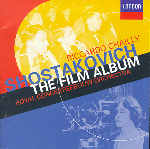 Already some time ago I went aboard in a modest enterprise that included an investigation, not too exhaustive, on the main figures of the symphonic music of the beginning of the century; one of these figures was, naturally, Dimitri Dimitrievic Shostakovitch. In spite of the relative simplicity of the project, the hardest part was to find information on the Russian composer's film career; this ellipsis constituted the common denominator that dominated the most general texts. This is symptomatic of the undervaluation (in the best of the cases) to which has always been subjected the cinema music on the part of the orchestral conductors and contemporary musicians, not to speaking of the fundamentalist critics; in Shostakovitch's case, a composer of "serious music" that has written symphonies and concerts, would be to hide the use of his talent to the service of a inferior media, not very appropriate to the genius of such a remarkable composer.
Already some time ago I went aboard in a modest enterprise that included an investigation, not too exhaustive, on the main figures of the symphonic music of the beginning of the century; one of these figures was, naturally, Dimitri Dimitrievic Shostakovitch. In spite of the relative simplicity of the project, the hardest part was to find information on the Russian composer's film career; this ellipsis constituted the common denominator that dominated the most general texts. This is symptomatic of the undervaluation (in the best of the cases) to which has always been subjected the cinema music on the part of the orchestral conductors and contemporary musicians, not to speaking of the fundamentalist critics; in Shostakovitch's case, a composer of "serious music" that has written symphonies and concerts, would be to hide the use of his talent to the service of a inferior media, not very appropriate to the genius of such a remarkable composer.Therefore, it is joyful an edition so praise as that which occupies us, which contributes to destroy that classist conception, sort of taboo embedded in the narrow minds of these people; under the skillful baton of Riccardo Chailly, the pages of Shostakovitch acquire an unusual validity, given the restricted academic language that ooze their staffs. In the works influenced by the western compositive ways, as The Counterplan (1932) or Alone (1930-31), this cultural loan is even more evident thanks to the perfect performance of the Royal Concertgebouw Orchestra and Riccardo Chailly which, over all, has an end a complete fidelity to the pieces; and is, precisely, this western avant-garde mind, also present in the famous Lady Macbeth of Mtsensk (1939) -so reviled by the Russian critic of the time-, the one that makes that his music sounds very familiar, almost English in occasions. Avant-garde, also, is the select instrumentation used in many of the suites, like that sinister theremin used in the sequence of the storm of Alone and its own orchestral treatment, precedent of the prelude of Citizen Kane (1941) by Bernard Herrmann, with the low trombones so guttural (and that they give faith of the Russian's visionary mood, and of his influence in ulterior musicians). D.R.C.


